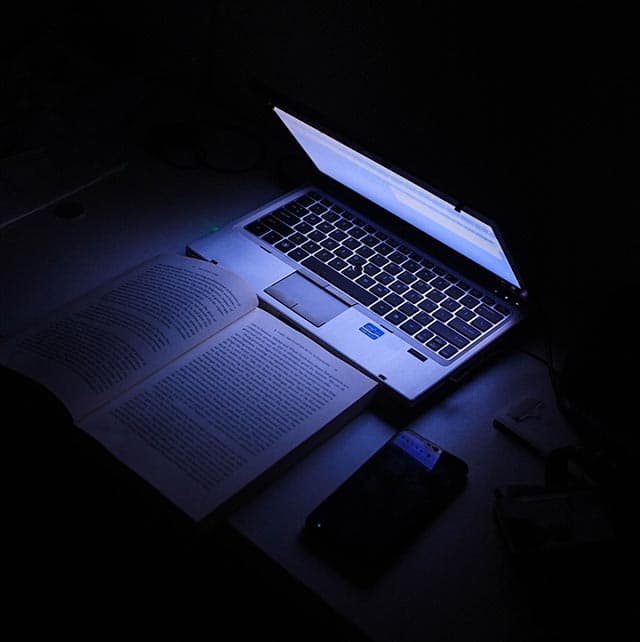Over exposure to high energy visible (HEV) blue light may be harmful to your health, and has become a rising concern among eye care professionals.
What is blue light?
Sunlight consists of all different shades of red, orange, yellow, green and blue light rays, called the visible light spectrum. Each color contains electromagnetic particles that constantly radiate energy as they travel in waves— varying in wavelength and power, and releasing different amounts of energy into the atmosphere. Shorter wavelengths emit more energy than longer wavelengths.
On the visible light spectrum, blue light, also called high energy visible light (HEV), emits a high amount of energy into the atmosphere, though it contains one of the shortest wavelengths.
Blue light exposure is beneficial to our physical and mental health. In healthy doses, blue light has the ability to:
- Increase alertness
- Enhance cognitive function
- Improve memory
- Elevate mood
Moreover, exposure to natural blue light helps to regulate circadian rhythm— the body’s natural sleep/wake cycle.
With all of its benefits, why is it so harmful?
It is true that the sun’s blue light can be beneficial to your health. However, research has shown that over time, certain types of blue light, mainly from an artificial source, may be harmful to your eyes.
Modern technology, such as computers, tablets, televisions, smartphones, and even LED and fluorescent lighting emit artificial blue light that can cause disruptions in sleep patterns, computer vision syndrome (CVS), and even sight-threatening ocular diseases such as, age-related macular degeneration and retinal detachment.
Eye doctors are becoming more and more concerned over the long term effects blue light may cause due to the increasing use of electronic devices.
- 60% of people spend around six hours per day on their digital devices— resulting in constant daily exposure to harmful blue light.
- 80% of smartphone users check their phone within 15 minutes of waking up in the morning.
How do I know if blue light is affecting my eyes?
If you think blue light may be affecting your eyes, ask yourself the following questions:
Are you straining your eyes to see clearly while using the computer?
The higher energy emission and shorter wavelengths produce irregular light waves on the computer screen— creating a glare that can affect visual contrast and clarity. As a result, your eyes need to work harder to see clearly, and you may be feeling the effects— eye strain, headaches, dry eyes, blurry vision, and mental and physical fatigue.
Are you having trouble sleeping?
Prolonged exposure to artificial blue light has been shown to reverse the benefits of natural blue light exposure. Studies have shown that overexposure can cause disruptions in your circadian rhythm, affect your quality of sleep, and even put you at an increased risk for developing depression.
Blue light exposure before bedtime actually inhibits the production of melatonin— the chemical substance that makes us feel sleepy. Therefore, it is best not to use any type of digital device right before bedtime.
Contact an eye doctor near you if you think your eyes have been over-exposed to blue light.
SEE RELATED: Should I See an Optometrist or Ophthalmologist?
Can blue light cause eye disease?
According to recent studies, chronic exposure to blue light increases may your risk of developing retinal damage and macular degeneration— two ocular diseases that threaten vision loss.
Your eyes contain a substance called melanin which serves as a filter against harmful blue light radiation. However, while melanin may be effective in protecting our eyes from some blue light, it is not effective in protecting us against overexposure to blue light. Moreover, melanin decreases with age, leading to increased eye sensitivity and a weakened ability to withstand blue light as we grow older.
This results in a big problem— due to modern technology, we are constantly exposed to many devices that emit blue light, on a daily basis.
How can I protect myself from blue light?
As the melanin in our eyes is incapable of blocking the excessive amount of blue light we are exposed to on a daily basis, it is imperative that we take matters into our own hands. Don’t worry, there are many effective options on the market that will help to protect your eyes during different daily activities.
Photochromic lenses
To protect your eyes from blue light both indoors and outdoors, you may want to consider purchasing polycarbonate photochromic lenses.
These lenses are clear indoors, and darken when exposed to sunlight. Photochromic lenses not only provide the much needed protection from blue light, they also provide 100 percent UV protection.
Blue blocking lenses
For those who spend many hours working on the computer, and are concerned about overexposure to blue light, there is a solution for you!
Eye doctors recommend wearing special computer glasses that contain blue-blocking lenses, and anti-glare coatings that deflect blue light from the lens surface. The anti-glare coatings with blue light protection can also be added to your regular eyeglasses and sunglasses.
If you would like added protection, you can also place blue light filters on your computer or device. Keep in mind though that even with blue light protection, it is important to take frequent breaks when using a computer and reduce overall screen time in general.
Adjust lifestyle habits
While options are available for facilitating reduced harmful exposure to blue light, it is also important to follow these recommendations to further protect your eyes:
- Hold electronic devices further away from your face. This will reduce the intensity of the light radiation entering your eyes.
- Set ambient lighting to the approximate screen brightness set on your screen. This will ensure that your pupils remain smaller in size and limit the amount of light entering your eyes.
- Follow the 20-20-20 rule and take frequent breaks from your computer or digital device. Every 20 minutes, look at something 20 feet away, for 20 seconds. This recommendation will also prevent eye strain that results from prolonged screen time.
- Put your digital device away at least an hour before bedtime to increase your sleep quality and help you to maintain your natural circadian rhythm.
Blue light exposure is beneficial to our health. However, excessive exposure to this type of high energy light can be harmful to our eyes.
Thankfully, there are easy ways to protect our eyes from the harmful effects of blue light exposure.
LEARN MORE: Guide to Eye Exams
Schedule an appointment with an eye doctor to discuss purchasing special lenses, or other ways that you can adjust your lifestyle for optimal blue light protection.

